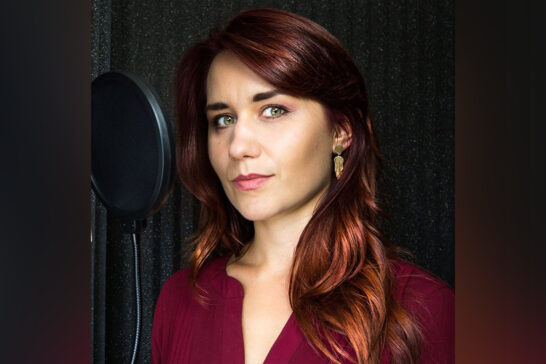Alumna Interview: Amanda Lynn Bottoms (Opera ’19)

Heralded for her “superb vocal and dramatic chops” by Opera News, with “stunning vocal beauty and absolute sincerity of expression” in Chicago Classical Review, acclaimed mezzo-soprano and Curtis alumna Amanda Lynn Bottoms (Opera ’19) is returning to her alma mater at the top of her 2024–25 season to appear as a guest artist, performing the roles she originated in Los Angeles this past summer, Ottone and Virtue in George Lewis’ and Claudio Monteverdi’s new work The Comet / Poppea. She will also appear with the Akron Symphony as the mezzo-soprano soloist in Gustav Mahler’s Symphony No. 2 and make her debut with the Detroit Opera as Sharonne Salaam in Anthony Davis’ The Central Park Five. Read Ms. Bottoms’ full biography HERE.
How did your time at Curtis shape your development as a musician and performer, and how did those experiences prepare you for the demands of life on the stage?
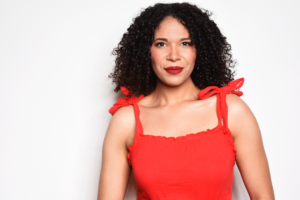 Curtis shaped me as an artist and, even more importantly, as a person, giving me an incredible amount of preparation for the rigors of both stage and life. Marlena Malas, along with the Curtis coaches, directors, staff, guest artists, and production teams, provided invaluable guidance that extended well beyond the classroom. I learned not only pedagogy and logistics but also the importance of forging my own unique path without fear, embracing the limitless ways to be an artist.
Curtis shaped me as an artist and, even more importantly, as a person, giving me an incredible amount of preparation for the rigors of both stage and life. Marlena Malas, along with the Curtis coaches, directors, staff, guest artists, and production teams, provided invaluable guidance that extended well beyond the classroom. I learned not only pedagogy and logistics but also the importance of forging my own unique path without fear, embracing the limitless ways to be an artist.
What do you look forward to most about reprising the roles of Ottone and Fortune in The Comet / Poppea and returning to your alma mater to collaborate with Curtis students for this unique production?
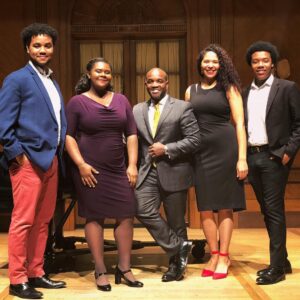 I was very excited to reunite with a number of the original production members and to see the ways in which we would continue building upon what we had done in Los Angeles while redeveloping the roles the students are taking on. There’s so much to love about a constantly spinning set and the way perspectives are altered for both audience and performers each night. I knew I would have the pleasure of being amidst the most promising rising talent, but the Curtis students’ intelligence, creativity, and tenacity, aside from their world-class instruments, far exceeded any of my expectations. This has been an incredibly exploratory and transformative period for Ottone and myself as well, as we rework the piece feeding off of the intense caliber of musicianship and the collaborative spirit that this institution inspires.
I was very excited to reunite with a number of the original production members and to see the ways in which we would continue building upon what we had done in Los Angeles while redeveloping the roles the students are taking on. There’s so much to love about a constantly spinning set and the way perspectives are altered for both audience and performers each night. I knew I would have the pleasure of being amidst the most promising rising talent, but the Curtis students’ intelligence, creativity, and tenacity, aside from their world-class instruments, far exceeded any of my expectations. This has been an incredibly exploratory and transformative period for Ottone and myself as well, as we rework the piece feeding off of the intense caliber of musicianship and the collaborative spirit that this institution inspires.
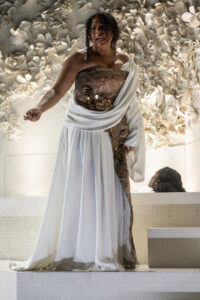 Performance is a demanding craft, especially as a vocalist, and most of the challenges occur before any production begins. It requires relentless refinement of the instrument in solitude, optimal physical and mental health, frequent travel, constant critique of voice and physicality, and many personal sacrifices, all while exposing an extremely vulnerable part of oneself to the world and hoping it will not falter due to a myriad of uncontrollable elements. From a technical level, Curtis equipped me to navigate these realities with the highest caliber of performance opportunities, auditions, coachings, personalized advice, and master classes. Beyond these elements, I was encouraged to lead with empathy, compassion, and humility, essential tools for both one’s personal life and artistic work. Curtis instilled in me a sense of worthiness and adaptability, enabling me to handle the highs and lows of my career and life with grace. I proudly graduated with a confidence and purpose that I continue to carry and share with the world around me.
Performance is a demanding craft, especially as a vocalist, and most of the challenges occur before any production begins. It requires relentless refinement of the instrument in solitude, optimal physical and mental health, frequent travel, constant critique of voice and physicality, and many personal sacrifices, all while exposing an extremely vulnerable part of oneself to the world and hoping it will not falter due to a myriad of uncontrollable elements. From a technical level, Curtis equipped me to navigate these realities with the highest caliber of performance opportunities, auditions, coachings, personalized advice, and master classes. Beyond these elements, I was encouraged to lead with empathy, compassion, and humility, essential tools for both one’s personal life and artistic work. Curtis instilled in me a sense of worthiness and adaptability, enabling me to handle the highs and lows of my career and life with grace. I proudly graduated with a confidence and purpose that I continue to carry and share with the world around me.
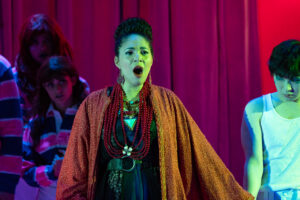 What I didn’t expect but have looked forward to each day since rehearsals began has been the beautiful nostalgia of being back at Curtis for an extended time. As I walk up the grand staircase of 1726 Locust Street, hearing a violinist work their way through a Mendelssohn excerpt or a mezzo-soprano coaching Carmen for the first time, a profound sense of longing for that special chapter of my life arises. The student’s inquiries about life and art have encouraged me to revisit the green, wide-eyed version of myself and wonder what does she still have left to learn? I feel like a student again, open to anything and endlessly curious. It has been a gift to be back at Curtis to play, learn and grow.
What I didn’t expect but have looked forward to each day since rehearsals began has been the beautiful nostalgia of being back at Curtis for an extended time. As I walk up the grand staircase of 1726 Locust Street, hearing a violinist work their way through a Mendelssohn excerpt or a mezzo-soprano coaching Carmen for the first time, a profound sense of longing for that special chapter of my life arises. The student’s inquiries about life and art have encouraged me to revisit the green, wide-eyed version of myself and wonder what does she still have left to learn? I feel like a student again, open to anything and endlessly curious. It has been a gift to be back at Curtis to play, learn and grow.
As a leading voice in contemporary opera, what do you find most rewarding about bringing these lesser-known characters to life, especially in contrast to embodying or preparing roles in works from the traditional operatic canon?
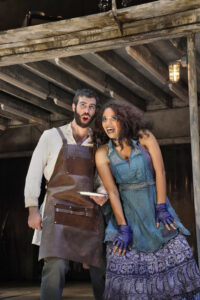 My younger self would have been surprised by the extent of contemporary opera’s influence on my career, but I am grateful for every moment. While I still cherish working within the traditional canon, it’s profoundly fulfilling to expand opera’s perceived boundaries through new works. Contemporary pieces allow me to channel the emotional and dramatic intensity of historic operas while often telling more nuanced and relevant stories. It is powerful to fuse together these seemingly dichotomous ends of the spectrums—musically, textually, technologically, and socially—and find the ways in which they inform, contrast, and challenge one another. As shown in The Comet / Poppea, our perception of the past and the ways we emulate it are deeply influenced by the present and future, especially in music.
My younger self would have been surprised by the extent of contemporary opera’s influence on my career, but I am grateful for every moment. While I still cherish working within the traditional canon, it’s profoundly fulfilling to expand opera’s perceived boundaries through new works. Contemporary pieces allow me to channel the emotional and dramatic intensity of historic operas while often telling more nuanced and relevant stories. It is powerful to fuse together these seemingly dichotomous ends of the spectrums—musically, textually, technologically, and socially—and find the ways in which they inform, contrast, and challenge one another. As shown in The Comet / Poppea, our perception of the past and the ways we emulate it are deeply influenced by the present and future, especially in music.
Perhaps the most meaningful aspect is shaping characters that reflect my lived experience, ensuring they are informed and true. The collaborative nature of contemporary opera, especially with access to composers and librettists, allows us to tailor roles to our individual voices and experiences. This adds authenticity to the characters we portray as opposed to the one-dimensional tropes of the past. It is also an opportunity for singers to reclaim space in an industry that often disempowered or ignored them—a moment of pride knowing you’ve had a hand in crafting a truth that will ultimately live on beyond you. It is essential we continue to create opportunities to document history and humanity, even when allegorical or fantastical, with integrity and honesty through art. I am proud to help contribute to a more equitable, humane, and liberated world through this work.
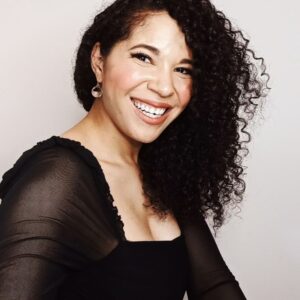
What sage advice do you have for current Curtis students and recent alums as they embark on a career in classical music and opera?
Define your values and let them guide you. What does a successful career mean to you? What does a life well-lived mean for you? Who are you today, and who do you want to become? What will it cost?
Your artistry is not defined by venues, ensembles, or the titles you hold but by the passion, dedication, and excellence you bring to everything you do. Every person and community deserves the opportunity to learn from and be transformed by what you have to offer. Your work, wherever it may unfold, has immense value, and it is this spirit of generosity and commitment that truly defines a great artist.
Remember: “If you want to go fast, go alone; if you want to go far, go together.” Curtis will always be a place to call home with a community that continues to support and believe in you.
Visit Amanda Lynn Bottoms’ official website HERE.
Interview with Amanda Lynn Bottoms by Ryan Scott Lathan.
Photo Credits: 1, 3, 7.) Photos courtesy of Amanda Lynn Bottoms and L2 Artists. 2.) Martin L. Clark Jr., Lindsey Reynolds, Lawrence Brownlee, Amanda Lynn Bottoms, and Aaron Crouch in a master class at Field Concert Hall, 2018; courtesy of Ms. Bottoms’ official Facebook page. 4.) Amanda Lynn Bottoms in The Comet / Poppea (2024), performance documentation from the Geffen Contemporary at MOCA. Image by Elon Schoenholz, courtesy MOCA and The Industry. 5.) Amanda Lynn Bottoms in Curtis Opera Theatre’s 2018 double bill of Kurt Weill’s Mahagonny: Ein Songspiel and Gian Carlo Menotti’s The Medium; Steven Pisano. 6.) Vartan Gabrielian and Amanda Lynn Bottoms in Curtis Opera Theatre’s 2018 production of Stephen Sondheim’s Sweeney Todd; Ken Howard.

